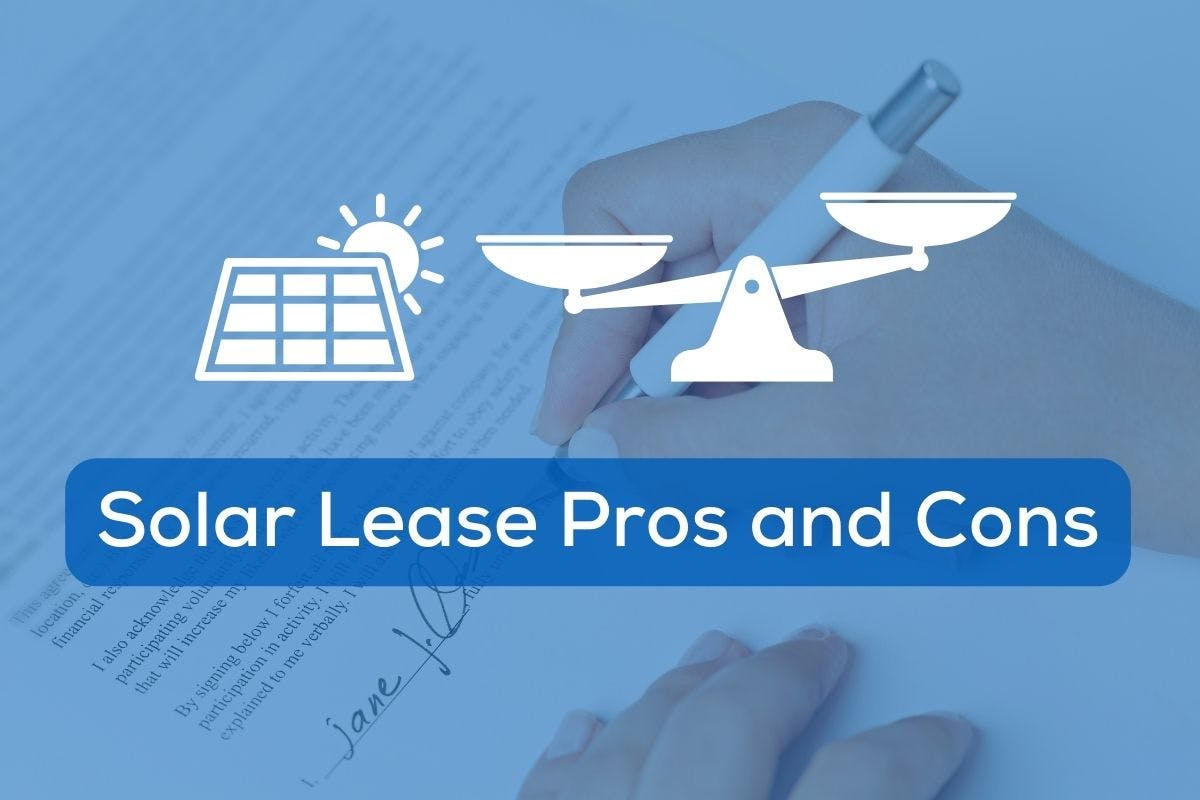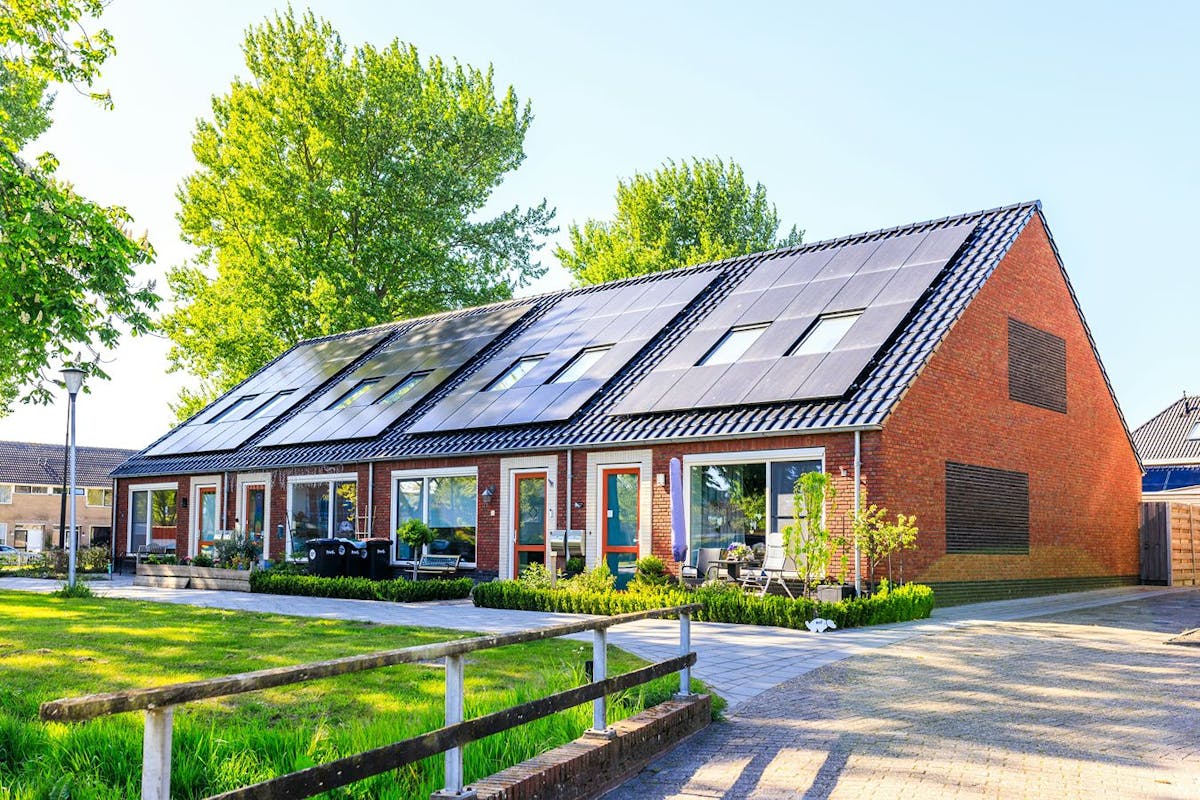Leasing Solar Panels: A Homeowner’s Guide to Solar Lease Pros and Cons
Last edited
Author
Andrew Giermak
Solar and Electrification Writer and Editor
Editor
Andrew Blok
Electrification and Solar Writer and Editor

Maybe you’re interested in going solar for your home electricity, but the big upfront cost of the system is giving you pause. Is there another way to have home solar power and save on your utility bills? For many, leasing solar panels makes the most sense.
A solar lease enables homeowners to reduce or eliminate the upfront investment costs and liabilities of system ownership while getting lower utility bills and reducing their carbon footprint. Before agreeing to a lease or PPA though, knowing the pros and cons, and what may vary from contract to contract, can help you make the best decision.
See how much you can save by going solar with Palmetto
Understanding Solar Leases
The US Department of Energy’s Better Building Initiative defines a solar lease as "a type of lease specific to solar energy systems where the lessor owns the solar equipment and the customer rents it at a fixed monthly rate."
In other words, after you sign, the solar leasing company owns the panels installed on your roof while you pay a fixed monthly payment, not unlike the lease of a personal vehicle.
Most solar leases last for 15, 20, or 25 years and can sometimes be extended even further. While the panels generate power on your roof, your utility electricity costs drop. This enables most solar leases to deliver immediate savings with a monthly price lower than your electric bill.
Five basic principles of a solar lease agreement
1. Homeowners leasing solar panels usually pay nothing upfront, then have predictable monthly payments for the duration of the agreement.
2. All of the power the solar panels generate is used in your home or goes to the utility grid. In most states, solar power going into the utility grid can generate bill credits through net metering or net billing.
3. Most solar leases include an annual escalator that raises monthly payments each year but is designed to increase slower than utility energy rates. If utility rates rise faster than your lease payments, you will save more money over the life of your agreement.
4. For the lifetime of the agreement, the solar installer owns, maintains, and monitors the solar panel system.
5. At the end of your agreement, the leasing company will remove your system or may present options to extend or buy out your lease, or begin a new lease with a new, upgraded system.
Solar lease vs. solar loan
Outside of purchasing solar panels with cash, loans and leases are the primary ways homeowners go solar. Using a loan, you can finance your solar panel installation, own the system, and qualify for the federal solar tax credit.

Credit: US EIA
Historically, most homeowners get greater long-term savings with solar ownership compared to a solar lease. If you use a loan, you’ll likely save less than with a cash purchase, but both qualify you for the 30% federal tax credit.
With all of this in mind, there are instances in which high financing rates, low tax liabilities, or plans for the future can impact the choice between a solar loan and a lease agreement.
See how much you can save by going solar with Palmetto
Solar lease vs. power purchase agreement
Similar to solar leases, power purchase agreements (PPAs) are another third-party ownership model that gives homeowners an alternative to buying solar panels. As the name implies, a solar PPA is an agreement in which you purchase the actual solar power generated rather than the equipment used to make it happen.
Solar PPAs aren’t available everywhere in the US and take different forms. They may entail the ongoing purchase of solar electricity produced on your roof or off your property, the latter of which is referred to as a "virtual" power purchase agreement and is often used in community solar projects.
In either form of solar PPA, you pay for the amount of solar electricity your home consumes rather than a fixed monthly lease payment. Solar PPA rates are typically locked in at prices lower than average utility bill electricity costs.
Pros and Cons of Leasing Solar Panels
You should weigh the pros and cons of leasing solar panels for your own circumstances. It’s best to weigh multiple contracts to determine what will provide the most savings and value.

Solar lease pros
Little or no upfront costs: A solar lease usually has no upfront installation cost.
Fixed, predictable energy payments: Solar lease payments are locked in and predictable for the length of your contract, unlike utility energy rates.
Immediate savings on energy bills: The power generated by your solar panels will reduce your energy bills.
Worry-free operation: The solar energy company that installs your panels is responsible for ongoing monitoring and maintenance.
No hidden costs: Any necessary panel, inverter, or part replacements are covered in your contract, as are your installation and eventual system removal.
Solar lease cons
Could save more by purchasing: While leasing is one way to save, owning your solar system will generally lead to greater long-term savings.
Lease transfer must be included in a home sale: If you decide to sell your home during a solar lease, you will need to transfer the contract to the new homeowner or terminate the agreement early.
Will not increase home value: Whereas purchased panels are an asset, leased solar panels do not increase home value.
Does not qualify for tax incentives or rebates: The majority of solar incentives can only be redeemed by system owners.
Limited control over system: Some people may be more comfortable with full control over their system.
Making the Decision: Is a Solar Lease Right for You?
A solar lease is a long-term commitment. Before you sign a contract, it’s critical to thoroughly review your lease terms and understand how the electricity the panels generate will impact your savings.
Both solar leases and ownership models can yield long-term savings, though solar leasing may be a better choice in the two circumstances explored below.
No financing necessary
Solar leases and power purchase agreements are ideal for those who prefer not to take on debt to go solar. Interest rates reached a 22-year high in 2023, and a solar lease can help you avoid paying for them. Instead, you’ll have predictable monthly payments for 20 years or more designed to lower your ongoing energy expenses.
Solar lease for savings without the Federal Tax Credit
The Residential Clean Energy Credit, also known as the Federal Solar Tax Credit, is a national incentive that helps homeowners reduce their total investment costs for a solar energy system purchase. As the incentive is an income tax credit—rather than a rebate or cash payment—the program is only valuable to those who pay federal income taxes.
Solar leasing may be a better option than a solar loan if you do not have a large enough tax liability to redeem the full solar credit (up to 30% of system costs). For example, a solar lease may be preferable for military personnel or retirees.
Note: This article is not tax advice, and you should always contact a tax professional to determine your eligibility.
Making Leasing Solar Panels Worth It
1. Analyze your energy habits at home. This includes quantifying the electricity you use and pay for, finding ways to reduce consumption, and predicting how things may change in the future.
2. Choose a lease with a solar production guarantee and an estimated energy output in writing. This will help ensure the solar panel system performs as advertised and delivers the value promised by your installer.
3. Consider multiple lease agreements and compare those options with proposals for solar ownership. If your primary goal is to save money, this step is critical to determine the best way to install a new solar system on your home.
4. Pay attention to any price escalators included in a proposed contract. This is important for both solar leases and PPAs.
5. Read the fine print. Beyond the dollar amount of your lease payment, pay attention to things like early termination fees, buyout options, and renewal clauses.
Discover the Palmetto LightReach Energy Plan
The Palmetto LightReach Energy Plan helps homeowners across the US save money with solar panels while we take care of everything else. LightReach offers predictable payments designed to lower your overall electricity costs in year one.
LightReach customers get a 90% system production guarantee, a guarantee that if actual energy output is less than 95% of the verified estimate Palmetto will pay for the shortfall, comprehensive solar system monitoring, access to the Palmetto App, and protection for the 25-year life of their agreement, with no unexpected, out-of-pocket costs, ever.
LightReach also includes buyout options after five years, easy lease transfer processes in the event of a move, and comprehensive project management from installation day through decades of solar power production.
See What You Can Save With a Solar Lease
Solar leasing lets homeowners embrace clean energy and save money. Choosing a solar lease or PPA can enable long-term savings without upfront costs or unexpected expenses later on.
Although those who purchase solar panels can take advantage of tax incentives and generally save more money in the long term, solar leasing lets you avoid high interest rates and works well for homeowners without a large federal income liability.
For more information about solar power for homeowners, visit the Palmetto Resource Library or Palmetto LightReach. If you'd like to see your estimated solar savings in a few quick clicks, go to our free solar savings calculator.
See what solar can do for you:
Frequently Asked Questions
Is it hard to sell a home with solar panels?
Data and reports have shown homes with solar panels are easier to sell and sell at higher prices than comparable homes without solar. Selling a home with a solar lease in effect can have more steps such as having the prospective buyer agree to continuing the lease.
What happens to solar panels at the end of a lease?
A contract for a solar lease will give the terms and options for the company and customer at or near the end of the lease. The lessee may be able to end the agreement and have the system removed, extend the current lease, buyout the system (this may be allowed to happen during the lease period), or begin a new lease with a new, upgraded solar system.
How long is a solar panel lease?
Most solar leases are 15-25 years. The lifespan of solar panels is generally 25 years or longer.
Disclaimer: This content is for educational purposes only. Palmetto does not provide tax, legal, or accounting advice. Please consult your own tax, legal, and accounting advisors.


